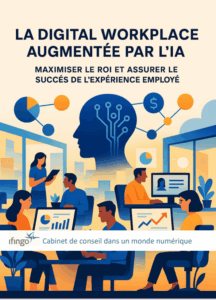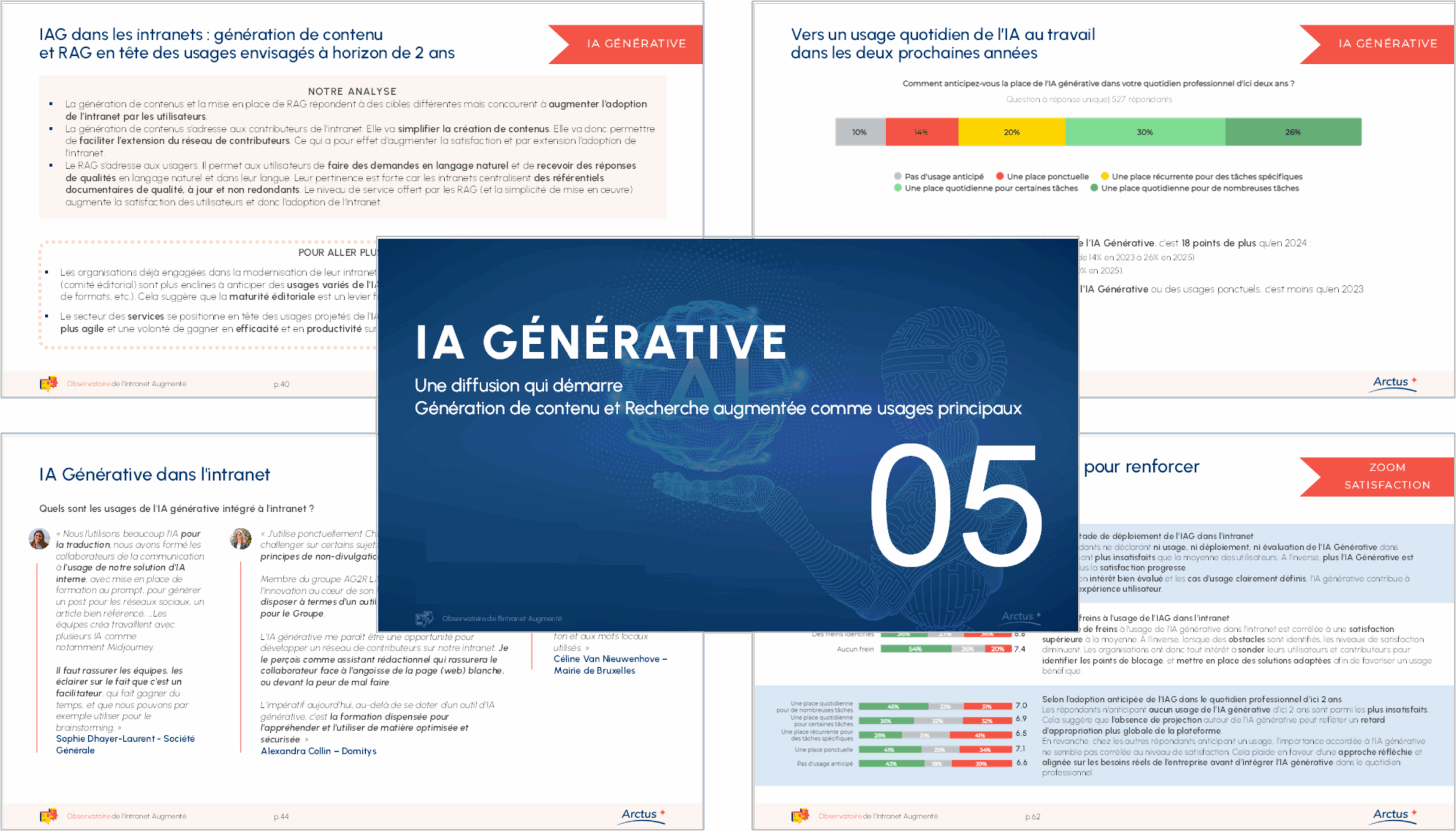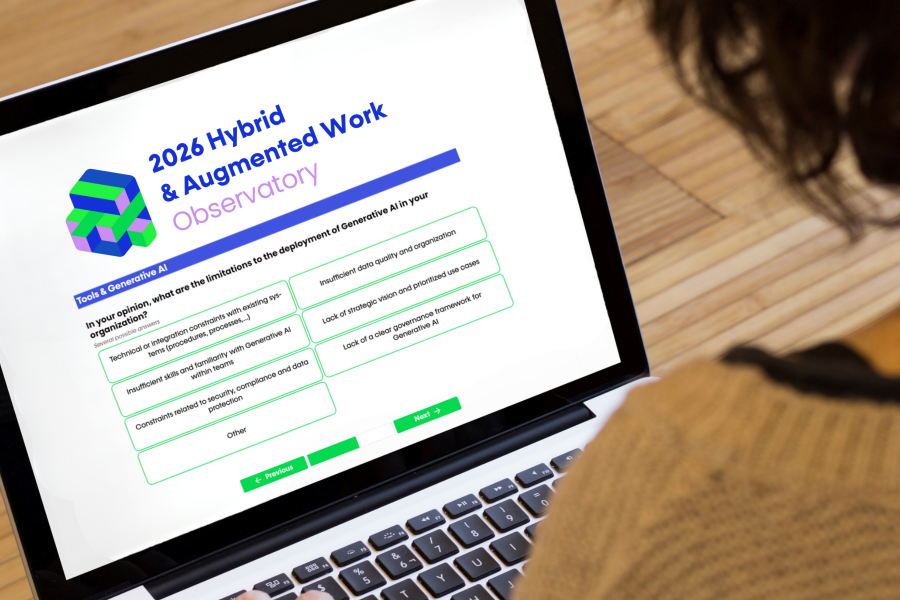THE DIGITAL WORKPLACE OF THE FUTURE IS SHAPED BY AI… BUT ABOVE ALL BY HUMANS

4 November 2025

Cet article revient sur les idées clés de sa contribution, ainsi que sur les grandes tendances issues de l’Observatoire de l’Intranet Augmenté 2025, en identifiant les leviers essentiels pour réussir durablement l’expérience employé.
A Digital Workplace centered on humans and digital well-being
L’IA va-t-elle accélérer la réussite de la transformation digitale ? Peut-être…mais ce sont les collaborateurs — leurs usages, leurs besoins, leurs pratiques — qui en déterminent le succès. Une Digital Workplace efficace est avant tout un environnement de travail fluide, cohérent et inclusif, qui favorise la concentration, la collaboration et le sentiment d’appartenance. Cela repose sur des outils simples, bien gouvernés et réellement utiles.
L’enjeu n’est donc pas technologique, mais organisationnel.
Créer des environnements numériques utiles, adoptés et bien pilotés implique de lever certains freins : silos organisationnels, manque de gouvernance, absence de stratégie éditoriale, outils mal intégrés.
Chez Arctus, nous observons que la gestion du changement est souvent plus complexe que la réalisation technique elle-même. A ce titre, l’Observatoire de l’Intranet Augmenté 2025 montre une évolution positive :
- Les organisations progressent en matière de gouvernance de leurs plateformes.
- La priorité se déplace vers la qualité et la cohérence des contenus, désormais considérées comme des leviers de performance et d’engagement.
- Les communicants internes, mieux outillés, revendiquent un rôle plus stratégique dans l’animation des espaces numériques.
- Et pour finir la satisfaction utilisateur progresse et passe de 6,3 en 2023 à 6,8 en 2025.
Mais alors, quel rôle l’IA peut-elle jouer dans cette dynamique ?

AI and Digital Workplace: Focusing on use cases with real added value
Après une année 2024 marquée par une forte effervescence autour de l’IA, 2025 marque une phase d’atterrissage. Les éditeurs de solutions collaboratives communiquent moins, mais les entreprises expérimentent, testent, trient — elles apprennent à distinguer la promesse marketing de la valeur concrète.
D’après l’Observatoire de l’intranet augmenté 2025, deux cas d’usage se démarquent par leur impact réel sur la performance et la satisfaction des collaborateurs :
- L’amélioration de la recherche documentaire : grâce au Retrieval Augmented Generation (RAG), les utilisateurs accèdent à une information plus pertinente, plus rapidement. L’IA combine la qualité des contenus internes à la puissance de la recherche sémantique : un gain d’efficacité considérable.
- Le soutien à la contribution et à la rédaction : l’IA devient un véritable assistant éditorial : correction, reformulation, suggestion de titres… Elle facilite la production de contenus de qualité, homogènes, alignés sur une charte éditoriale. Elle permet enfin de créer de la communication multi-formats : à partir d’une même idée, on pourra produire une brève, un billet de blog, l’image du jour…
Résultat : une meilleure implication des contributeurs, homogénéité du ton, une valorisation des contenus internes.
Pour autant, l’usage opérationnel de l’IA dans les intranets reste modeste : selon l’Observatoire de l’Intranet Augmenté 2025, moins de 10 % des organisations ont réellement déployé des usages IA dans leur Digital Workplace.

Pourquoi cette prudence ?
- Manque de maturité des organisations sur les usages « qui servent vraiment à quelque chose »
- Manque de maturité sur la gouvernance des données
- Enjeux éthiques
- Hausse des coûts : les licences intégrant l’IA coûtent de 40 à 100 % en plus, alors même que les budgets stagnent ou régressent.
Dans ce contexte, le conseil et la méthode redeviennent essentiels : aider les organisations à cibler les bons usages, sans se laisser emporter par l’effet de mode.
AI and Digital Workplace: Focusing on use cases with real added value
L’IA suscite de grandes attentes, mais elle ne remplace ni la culture d’entreprise, ni la stratégie, ni la vision collective.
Chez Arctus, nous sommes convaincus que la réussite d’une Digital Workplace passe d’abord par la transformation des usages.
Le véritable défi n’est plus de déployer un outil plus puissant, mais de le faire vivre dans la durée :
- Structurer les usages.
- Donner envie,
- Former,
- Accompagner
Même la meilleure plateforme ne crée aucune valeur sans gouvernance, stratégie éditoriale ni animation communautaire.
Nos leviers d’action :
- Clarifier les rôles et responsabilités (contributeurs, administrateurs, ambassadeurs)
- Outiller et professionnaliser les communicants internes
- Définir des indicateurs pertinents (adoption, engagement, qualité des contenus)
L’IA ne bouleverse pas ces dynamiques — elle les renforce, en soutenant la rédaction, la recherche, l’analyse… mais ne remplace pas la vision stratégique.
Conclusion: a Digital Workplace augmented… by humans
La Digital Workplace du futur ne sera pas simplement “augmentée” par l’IA. Elle sera améliorée, enrichie et humanisée par des collaborateurs engagés, outillés, accompagnés.
Les organisations qui réussiront seront celles qui :
- donnent du sens à leurs projets,
- alignent leurs dispositifs digitaux sur leurs valeurs,
- accompagnent durablement leurs collaborateurs.
Chez Arctus, nous croyons en cette alliance : une technologie intelligente au service d’une organisation plus humaine. Notre approche repose sur une neutralité technologique et une vision systémique : comprendre les interactions entre outils, pratiques et culture d’entreprise pour donner du sens à chaque projet de transformation interne.
Pour aller plus loin
👉 Téléchargez le livre blanc « La Digital Workplace du futur » publié par Ifingo, avec la contribution d’Arctus.
Vous y trouverez :
• Des analyses exclusives issues de l’Observatoire de l’Intranet Augmenté 2025
• Des cas concrets d’intégration de l’IA dans des environnements collaboratifs
• Des regards croisés d’experts sur les clés de réussite de l’expérience employé

Founder, Partner




